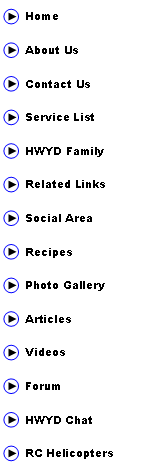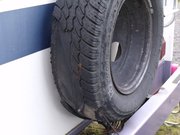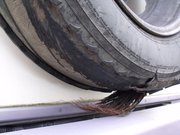


|
Home While You Drive - Ready! Set! RV! |
|
Home While You Drive |
|
Articles |
|
***Any advice followed from this article is at the readers own risk. The writer of this article is not responsible for any problems that may arise from the information contained in this article, nor the misuse of information here-in. Nor is the writer of this article responsible for any expenses that may arise.***
After problems with the tires I have on my motorhome, I am starting to get track of things that have been helping keeping the problems down to a minimum. So I thought I would share what has helped me and my motorhome. The damage that can be caused by tire blow-outs can be from mild to extreme. As mild as just the tire blowing out and having to replace it, to as extreme as damage to the RV and/or passengers. Tire safety on an RV ranks right up there with everything else in the RV. You have to take preventative measures to help keep the possible problems down to a minimum. Surprisingly a lot off people still take the RV's tires for granted till something goes wrong. So I am hoping this article will help put tire safety right up there near the top of the list. I have been lucky, the first blow-out didn't do any damage to my motorhome, or cause an accident. Our second blow-out how ever, did a little bit more. When the tire blew out it also took out the arctic-pac that helps keep our black water tank from freezing during cold weather. Thankfully no other damage or accidents were cause from it. But admittedly both instances were scary for my family and I. So here goes with the advice that I can provide.
First and foremost is tire pressure. There are 2 tire pressures you have to be aware of. The first is the pressure listed on the tire, that is the max pressure for the tire. The second is the one listed on your information placard inside your rig. Your tire pressure needs to be in-between both of those pressures according to how much weight you are carrying. But never go above the max tire pressure listed on the tire. If you are having problems in figuring out the pressure you need. Go to your local qualified tire store or RV shop. They can help you figure out the right pressure for your needs. Not only will this help decrees the chance of blow-outs, it will also help with gas mileage and keeping your tires cool. You can also purchase tire monitoring systems, that will help keep track of tire pressure in all of the tires as well as their temperatures.
Another thing to keep in mind while you are at the tires is looking for cracks, damages, bubbles, tread thickness or anything that doesn't look right. There are a surprising number of people that will check their tire pressure, but not bother looking at their tires for any damage. No matter how minor the damage may be, or may look to you, each peace of damage will weaken the tire. Make sure to take the tire/rig in so it can be looked at and assessed for damage. If you go to a reputable tire store, they wont try to sell you a tire if you don't need it, but they will help you make sure you are driving safe on your tires. If you think about it. You look at your tire and see a crack, think to yourself, of that's not to bad, then drive 50 to 100 miles and the tire blows. Now looking back, you need to take into account that those tires heat up while driving and braking. And with the tires heating up, it causes the air in the tires to expend and the rubber to become more pliable. With the air in the tires expanding causing a higher air pressure in the tires and the rubber weakening/becoming more pliable from the heat, it puts a lot of stress on that crack and boom, thud, thud, thud. The tire is toast.
Since I was talking about tire heat in that last section. I think it would probably be a good thing to cover that now. Yes when your are driving your car, truck, van or what ever, or you are towing a rig, as long as those tires are moving or you are using the brakes, the tires will heat up from the friction. As the tires heat up, it also heats up the air inside the tires. Causing the air to expand and raising the tire pressure. If the tires are over inflated or over loaded, this can cause a blow out. Make sure to take 2 readings of tire pressure when you are traveling. One on cold tires for the actual pressure reading and one on hot tires after driving, for the max heat reading. A lot of people will tell you not to do this because it will give you an inaccurate reading. For the most part that is true. But the information you are looking for when taking a hot reading is are you running over pressure because of the expansion. You will not do much with the hot reading other then take notes to show a tire specialist, unless your are competent with tires and what needs to happen. But if the hot reading is dangerously high, it will at least let you know at that time to let the tires cool for a while before continuing to drive. Which will help prevent a blow-out from happening (NOT totally prevent). One thing you can do to help keep track of the tire temperatures if you don't have a TPMS (Tire Pressure Monitoring System) is purchase an inexpensive Non-Contact Inferred Thermometer from an auto parts store of electronics store. All you have to do with those is hold them within a foot of the tire (follow manufacturers instructions), pull the trigger and it will show the temperature on the display. Then you can log that information along with the tire pressure when you check them.
Another thing that has helped me with tire leaks is changing the rubber valve stems from rubber to metal. For me at least, they seem to hold up better then the rubber ones on the larger tires. And I also make sure when they put a new tire on the rim or patch the current tire, that they also put a new gasket/seal on the valve stem. I find that those gasket/seals break down pretty easy.
Another thing you want to look at if you run duals on your rig, is that your tires are not rubbing against each other. Not only does this wear the tires down faster where they are rubbing, but the friction also produces a lot of heat.
If you like washing your tires when you wash your rig. You might want to think about that again. The tires have a chemical in them to help prevent oxidization and protect the tires in the weather. The more you wash them, the less of the chemicals will work or will be there. You want to clean the tires less frequently then you do your rig. Even the specially formulated tire washes can remove the protective chemicals.
If you park for long periods of time, you may want to consider getting tire covers, to help block the damaging uv rays from hitting your tires and help keep the rain and debris off of them as well.
A note on trailers and other rigs that run dual axles. If you run a dual axle trailer or other rig and you keep experiencing blow-outs, but can't find a cause. You might consider having the axles alignment checked. If the axle are out of alignment, that can cause excessive wear on the tires that can lead to blow-outs.
One last thing, before I forget. Watch the weight of your rig. If your rig is over weight, this can lead to a lot of problems and even possible tickets. But running your rig over weight puts a lot of stress on the tires. Check your placard for weight information. And also make sure to evenly distribute the weight. Have more on one side can be a recipe for disaster.
This is a little side note. But since it deals with the tires. I might as well add it here. I have heard from other RVers, that if you put dryer sheets on your tires (weighing them down so they don't go any where), that it will help detour bugs away from your rig. I haven't personally tried this. But think I will next time I go out on a trip.
I hope this information helps you. If you have anything you would like to contribute or think there needs to be a correction, please leave a comment. Any help with keeping everyone safe, is always welcome. |
Submitted Article—A Note On RV Tire Safety |


